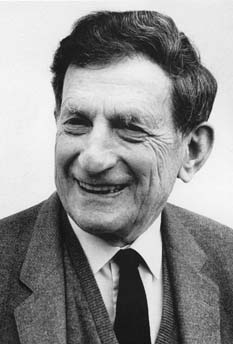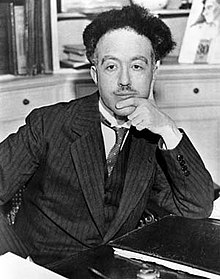David Bohm known by its theory of hiden variables has written a book with the title " Causality and chance in modern physics". This book was foreworded by the physist Louis De broglie as follows:
THOSE who have studied the development of modern physics know that the progress of our knowledge of microphysical phenomena has led them to adopt in their theoretical interpretation of these phenomena an entirely different attitude to that of classical physics. Whereas with the latter, it was possible to describe the course of natural events as evolving in accordance with causality in the framework of space and time (or relativistic space-time), and thus to present clear and precise models to the physicist’s imagination, quantum physics at present prevents any representations of thistype and makesthem quite impossible. It allows no more than theories based on purely abstract formulæ, discrediting the idea of a causal evolution of atomic and corpuscular phenomena; it provides no more than laws of probability: it considers these laws of probability as having a primary character and constituting the ultimate knowable reality: it does not permit them to be explained as resulting from a causal evolution which works at a still deeper level in the physical world. We can reasonably accept that the attitude adopted for nearly 30 years by theoretical quantum physicists is, at least in appearance, the exact counterpart of information which experiment has given us of the atomic world. At the level now reached by research in microphysics it is certain that the methods of measurement do not allow us to determine simultaneously all the magnitudes which would be necessary to obtain a picture of the classical type of corpuscles (this can be deducéd from Heisenberg’s uncertainty principle), and that the perturbations introduced by the measurement, which are impossible to eliminate, prevent us in general from predicting precisely the result which it will produce and allow only statistical predictions. The construction of purely probablistic formulæ that all theoreticians use today was thus completely justified. However, the majority of them, often under the influence of preconceived ideas derived from positivist doctrine, have thought that they could go further and assert that the uncertain and incomplete character of the knowledge that experiment at its present stage gives us about what really happens in microphysics is the result of a real indeterminacy of the physical states and of their evolution. Such an extrapolation does not appear in any way to be justified. It is possible that looking into the future to a deeper level of physical reality we will be able to interpret the laws of probability and quantum physics as being the statistical results of the development of completely determined values of variables which are at present hidden from us. It may be that the powerful means we are beginning to use to break up the structure of the nucleus and to make new particles appear will give us one day a direct knowledge which we do not now have of this deeper level. To try to stop all attemptsto pass beyond the present viewpoint of quantum physics could be very dangerous for the progress of science and would furthermore be contrary to the lessons we may learn from the history of science. This teaches us, in effect, that the actual state of our knowledge is always provisional and that there must be, beyond what is actually known, immense new regions to discover. Besides, quantum physics has found itself for several years tackling problems which it has not been able to solve and seems to have arrived at a dead end. This situation suggests strongly that an effort to modify the framework of ideas in which quantum physics has voluntarily wrapped itself would be valuable.
One is glad to see that in the last few years there has been a development towards re-examining the basis of the present interpretation of microphysics. The starting point of this movement was two articles published at the beginning of 1952 by David Bohm in the Physical Review. A long time ago in an article in the Journal de Physique of May 1927 I put forward a causal interpretation of wave mechanics which I called the “theory of double solutions” but I abandoned it, discouraged by criticisms which this attempt roused. In his 1952 paper Professor Bohm has taken up certain ideas from this article and commenting and enlarging on them in a most interesting way he has successfully developed important arguments in favour of a causal reinterpretation of quantum physics. Professor Bohm’s paper has led me to take my old concepts up again, and with my young colleagues at the Institute, Henri Poincaré, and in particular M.Jean-Pierre Vigier, we have been able to obtain certain encouraging results. M.Vigier working with Professor Bohm himself has developed an interesting interpretation of the statistical significance of |Ψ| 2 in wave mechanics. It seems desirable that in the next few years efforts should continue to be made in this direction. One can, it seems to me, hope that these efforts will be fruitful and will help to rescue quantum physics from the cul-de-sac where it is at the moment.
In order to show the legitimacy and also the necessity of such attempts, Professor Bohm has thought that the moment had come to take up again in his researches the critical examination of the nature of physical theories and of interpretations which are susceptible to explaining natural phenomena as fast as science progresses. He has compared the development of classical physics, where in succession the viewpoint of universal mechanism, and then of the general theory of fields, and then of statistical theories have appeared, one after the other, with the introduction by quantum physics of its own new conceptions. He has shrewdly and carefully analysed the idea of chance and has shown that it comes in at each stage in the progress of our knowledge, when we are not aware that we are at the brink of a deeper level of reality, which still eludes us. Convinced that theoretical physics has always led, and will always lead, to the discovery of deeper and deeper levels of the physical world, and that this process will continue without any limit, he has concluded that quantum physics has no rightto consider its present concepts definitive, and thatit cannotstop researchers imagining deeper domains of reality than those which it has already explored.
I cannot give here a complete account of the thorough and fascinating study which Professor Bohm has made. The reader will find a very elegant and suggestive analysis which will instruct him and make him think. No one is better qualified than Professor Bohm to write such a book, and it comes exactly at the right time.
Reference: https://philosophy-of-sciences.blogspot.com/2018/12/causality-and-chance-in-modern-physics.html



إرسال تعليق